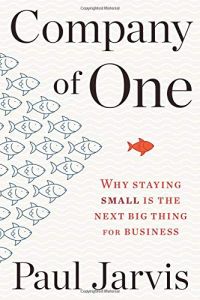Join getAbstract to access the summary!

Join getAbstract to access the summary!
Paul Jarvis
Company of One
Why Staying Small Is the Next Big Thing for Business
Houghton Mifflin Harcourt, 2019
What's inside?
A “company of one” intentionally stays small and questions the bigger-is-better growth mind-set.
Recommendation
Most companies want to get bigger and earn more. They hire more people, set up big offices and seek more buyers. A “company of one” stays small on purpose. In his bestseller, Paul Jarvis, a company of one himself, shows you how to start and run a small firm, though not necessarily a one-person operation. You can be a small group in a larger organization, but in a small firm, you know what your clients want because you talk to them. Jarvis alludes to one caveat: Staying small sounds ideal, but consider how much time you’d need for marketing, administration and such to live small and thrive.
Summary
About the Author
Paul Jarvis was a freelance designer/strategist for Microsoft, Yahoo, Mercedes-Benz, and other clients. He now teaches online classes, hosts podcasts and develops software from his island home off the British Columbia coast.

















Comment on this summary